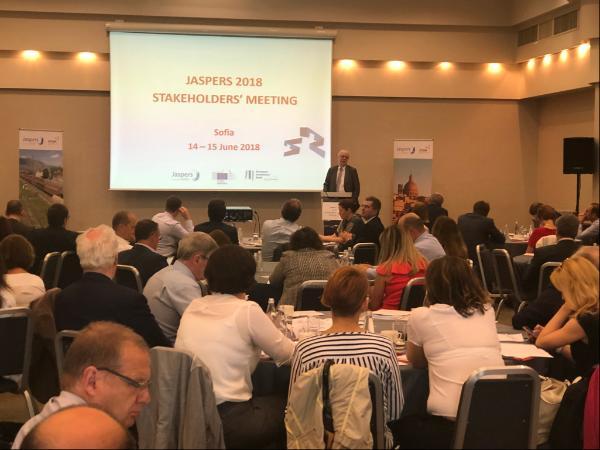
- JASPERS has supported preparation of more than 600 major projects in 21 beneficiary countries
- Tenth stakeholder meeting in Sofia on 14/15 June 2018 discussed achievements and future plans
On 14/15 June 2018 JASPERS (Joint Assistance to Support Projects in European Regions) held its tenth annual stakeholder meeting in Sofia. Since its launch, JASPERS has completed more than 600 assignments in 21 beneficiary countries and represented a key part of the EIB’s advisory services. The projects supported by JASPERS and approved by the European Commission for EU co-financing have mobilised total investment of more than EUR 100 billion.
EIB Vice-President Vazil Hudák commented: “JASPERS is a very efficient and proven tool for correctly allocating EU grants to implement priority projects across Europe. These projects catalyse more investment and strengthen the competitiveness of the less-developed regions for the benefit of European citizens. We are looking forward to continuing to provide JASPERS advisory services also in the upcoming 2021-2027 financing period.”
More than a hundred representatives from JASPERS beneficiary countries and partners attended the event. JASPERS’ high added value in EU-funded projects was stressed in the meeting’s opening remarks by Bulgaria’s Deputy Minister of Regional Development and Public Works Denitsa Nikolova, Director of the EIB’s Operations for Central and South Eastern Europe Department Anita Fürstenberg-Lucius and Director of the European Commission’s Directorate‑General for Regional and Urban Policy (DG REGIO) Erich Unterwurzacher.
The topics covered by the meeting included lessons learned during the delivery of projects under the current programming period as well as the kind of support required for the next programming period. The lessons learned included technical issues identified during project appraisals, mostly in major projects prepared without JASPERS support, allowing these to be improved in future projects to be submitted for financing. Projects supported by JASPERS are less prone to interruptions during the approval process at the European Commission and in a better shape for financing by potential lenders. This support could be extended also for the next programming period, together with the current capacity building activities, to improve the institutional quality of counterparts. Participants expressed the need to strengthen JASPERS’ role in supporting strategic planning, upstream project development, and cross-border and cross-sector projects.
EU Members States underlined their satisfaction with JASPERS and, in addition to the ongoing support for project preparation, expressed their interest in continuing this support. This interest refers not only to the current programming period but also to 2021-2027.
JASPERS focuses on:
- assisting EU Member States and IPA countries in preparing high-quality projects to be co-financed by EU funds;
- rolling out the Independent Quality Review of major projects for Member States before submission to the European Commission for grant funding;
- providing appraisals to the European Commission for projects submitted directly by Member States, which are an important part of its internal approval process;
- undertaking capacity building activities aimed at increasing technical and administrative capacities in beneficiary countries.
JASPERS’ role in providing technical assistance and capacity building has been crucial in enabling Member States to enjoy the full benefits of EU cohesion policy at many different levels. This is achieved, for example, through support to policymakers in the development of national strategies, help with preparing projects in emerging sectors, knowledge transfer throughout the project cycle and support for implementation.
JASPERS operates under three separate mandates: from DG Regional and Urban Policy (DG REGIO) for investment funded under the Structural and Cohesion Funds; from DG Neighbourhood and Enlargement Negotiations (DG NEAR) for investment funded under the IPA Funds; and from DG Mobility and Transport (DG MOVE) for transport projects benefiting from the Connecting Europe Facility (CEF).

Photographer: Dusan Ondrejicka ©EIB
Download original